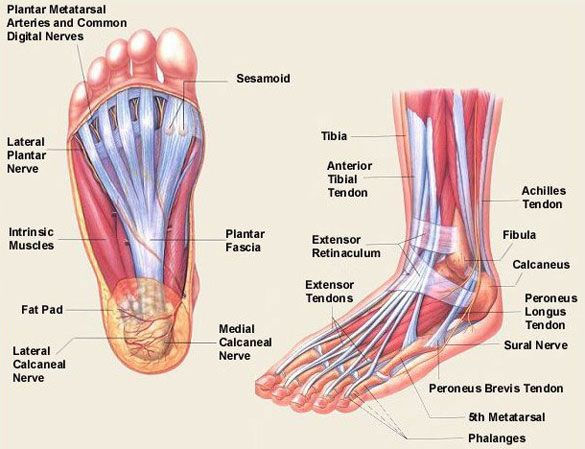Plantar Fasciitis
- Pentons Performance Therapy
- Aug 28, 2019
- 2 min read
Updated: Aug 29, 2019
Plantar Fasciitis is a condition where the ligament tissue that runs along the sole of the foot becomes irritated and inflamed. Mostly commonly an overuse injury, especially in sports where repetitive loading is put through the foot and ankle. The plantar fascia acts as a shock absorber through the foot allowing movement through the metatarsal, phalanges and ankle joint. The biomechanics of the foot and ankle are complex but incredibly efficient. Pain is often felt close to the heel (Calcaneus) on the sole of the foot but can be anywhere along the Plantar Fascia. Symptoms are usually worse first thing in the morning or after periods in which the foot has not moved. Intense and prolonged Plantar Fasciitis can lead to heel spurs where bony deposits are left on the Calcaneus caused by the irritated and tight plantar fascia pulling too hard from its origin.

The plantar fascia and Achilles tendon act as springs to absorb shock and in accordance to Newtons third law of motions (To every action there is always opposed an equal reaction: or the mutual actions of two bodies upon each other are always equal, and directed to contrary parts) allow a rebound effect to propel the body.
Warning Signs and Symptoms of Plantar Fasciitis
A sharp stabbing pain from the sole of the foot, usually more towards the heel.
Pain is worse first thing in the morning.
A feeling of bruising on the sole of the foot.
Irritation usually occurs after activity as opposed to during.
Limited or inability to raise toes up with the foot flat on the floor.
What Causes Plantar Fasciitis?
Repetitive exercise in soft or no shoes on hard surfaces
Sudden increase in repetitive load through the foot (running/walking)
Being overweight
Tight Gastrocnemius and in particular Soleus muscles.
Spending long periods of time on your feet
Abnormal arches, flat or high.
Poorly fitting shoes.
How do we treat Plantar Fasciitis at Pentons Performance Therapy?
As with all our treatments we start with a full assessment to fully diagnose the issue as well as to understand why the injury may have occurred in the first place. Diagnosis involves palpation of the foot and plantar fascia, muscle testing and range of motion tests of the lower limb including hips so we can fully understand the issue.
Once a full diagnosis has been established along with any potential causes, we can treat plantar fasciitis with a range of mobilisation techniques. This allows us to manipulate the muscles to regain joint function and enable the surrounding muscle to begin to function properly once again. Massage to the posterior chain including glutes and lower back is often involved as well.
We will also run you through a detailed aftercare programme aimed at restoring normal muscle function and strength to ensure the problems don't return.
Been suffering with foot problems or want to know more about Plantar Fascitiis?
Get in touch
Or Book in Now

Comments